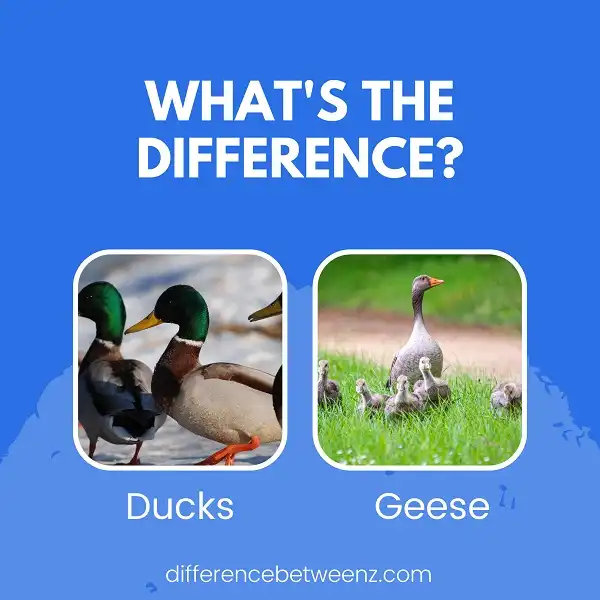There are many differences between ducks and geese, the most obvious being their size. Geese are typically larger than ducks, with longer necks and a heavier build. Another major difference is the way they fly. Ducks have a more direct flight pattern, while geese fly in V-formation which allows them to conserve energy. Their habitats also differ; ducks prefer to live near water, while geese can be found in both wet and dry areas.
Finally, ducks typically eat insects and aquatic plants, while geese will eat grasses and other vegetation. While there are many distinctions between these two types of birds, it’s important to remember that they both serve an important role in our ecosystems.
Who are Ducks?
Ducks are a type of waterfowl that are related to geese and swans. Ducks are found all over the world, and there are many different species of ducks. Ducks generally have webbed feet, which help them to swim, and they also have feathers that are waterproof, which helps to keep them warm and dry. Ducks eat a variety of food, including plant material, insects, and small animals. Ducks generally live near water, such as ponds, lakes, or rivers. Some ducks, such as the mallard duck, can also fly. Ducks are interesting birds, and they play an important role in the ecosystem.
Who are Geese?
- Geese are waterfowl of the family Anatidae. This family also includes ducks and swans. Geese are monogamous, meaning they mate for life. Both parents help to care for their young. Geese typically live in flocks. The largest flock on record contained over two million birds. Geese are migratory, meaning they travel to different locations depending on the season.
- Some species of geese migrate over very long distances, covering up to 6,000 miles in a single year. Geese are known for their distinctive honking call. This call is used for communication between members of a flock, and can also be heard during mating season or when an individual perceives a threat. Geese are federally protected in the United States and many other countries.
- This means it is illegal to kill or harm them without a permit. Geese are valuable animals because they help to control invasive plant species and pests, and their droppings can be used as fertilizer. Geese can also be trained to perform various tasks, such as herding livestock or guarding property. Consequently, these animals play an important role in both the natural world and human society.
Difference between Ducks and Geese
Ducks and geese are both waterfowl, but there are some important differences between the two. Ducks are generally smaller than geese, and they have shorter necks and legs. Ducks also tend to be more social, while geese are more likely to form pairs or small groups. In terms of diet, ducks eat a variety of food including plants, insects, and small animals. Geese, on the other hand, are mostly herbivores and primarily eat grasses and other plants. Ducks usually live in wetlands, while geese can be found in both wetlands and upland habitats. These differences help to distinguish ducks from geese, making them two distinct groups of waterfowl.
Conclusion
Ducks and geese are both waterfowl, but they have a few key distinctions. Geese tend to be larger than ducks, and they typically have longer necks. Geese also migrate further than ducks, often traveling thousands of miles each year. While there are many different types of ducks, the most common type is the mallard. Mallards can be found all over the world, and they’re known for their green heads and brown bodies.


